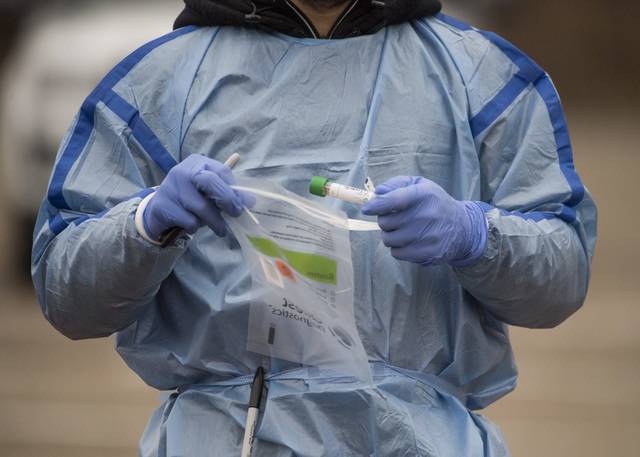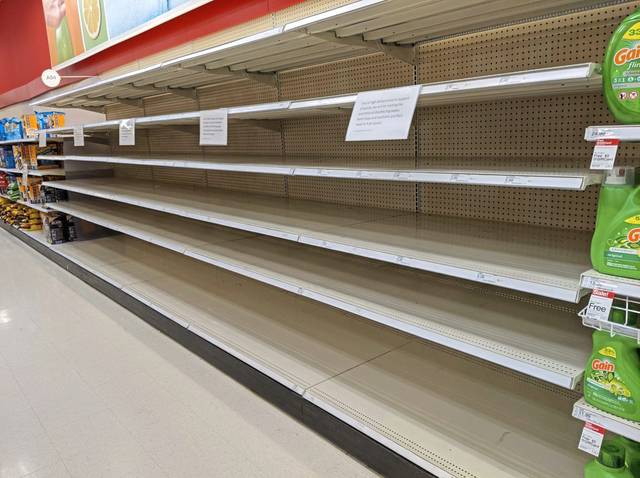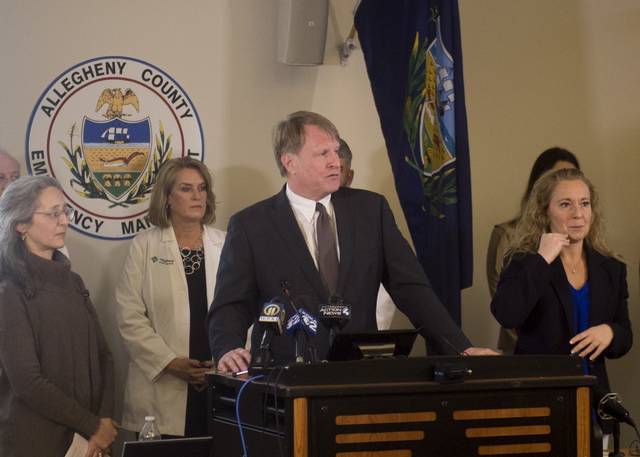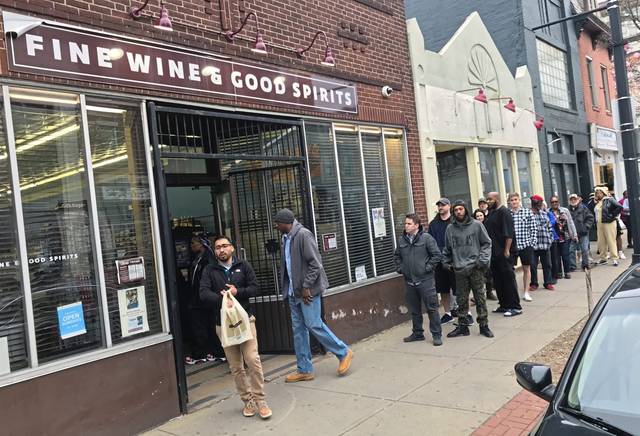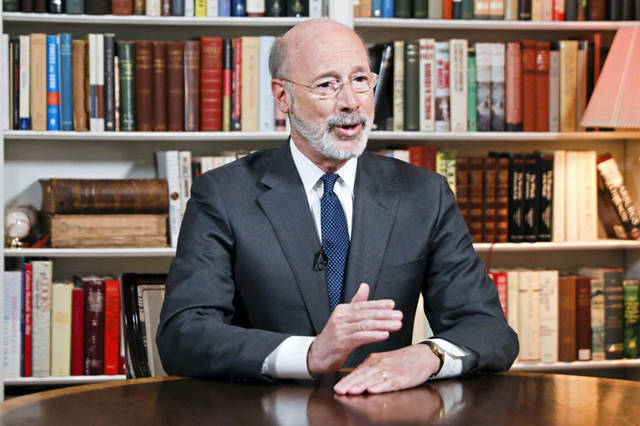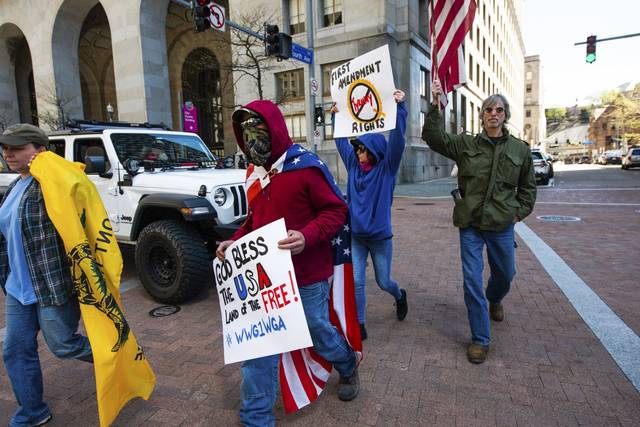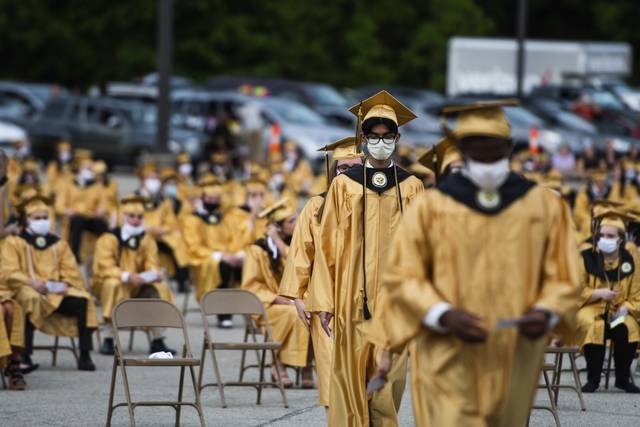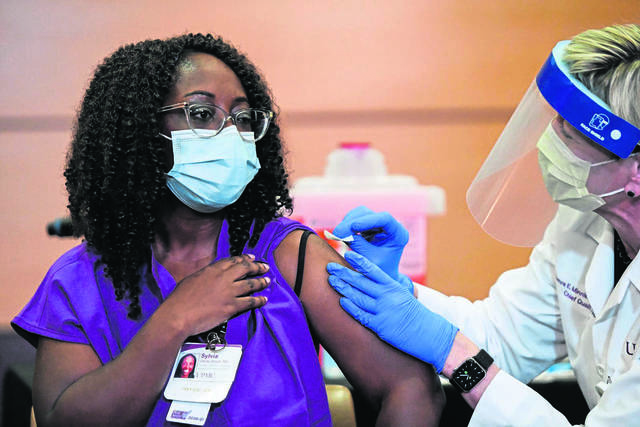Stories of the Year: From detection to vaccine, coronavirus dominated 2020
Seldom is a subject such an obvious choice for story of the year.
But unlike 2001’s 9/11 or 2016’s election, the coronavirus story kept happening — day after day after day. Like the virus itself, the story just wouldn’t stop.
It appears it will consume 2021 as well.
From reports of a “new illness” in China in January to the approval and distribution of vaccines in December, the tale of covid-19 is complex. It’s been an incredible, agonizing, frustrating, infuriating, daunting and deadly journey.
Coronavirus’ story actually began in December 2019, when 41 cases were first identified in Wuhan, China. Many researchers believe the virus originated in bats, although further studies are being conducted.
One thing is clear: 2020 began with the coronavirus already in progress and gained steam at an excruciating pace.
Jan. 9
Xinhua reported the new-type coronavirus was determined to be the cause of a viral pneumonia in Wuhan. Scientists said it “may take years for researchers to develop medicines and vaccines.”
Jan. 11
The World Health Organization announced Chinese scientists had sent the genetic sequences for the new illness.
BREAKING: WHO has received the genetic sequences for the novel #coronavirus (2019-nCoV) from the Chinese authorities. We expect them to be made publicly available as soon as possible. pic.twitter.com/h1w7A0jBm2
— World Health Organization (WHO) (@WHO) January 11, 2020
Jan. 17
Three U.S. airports — in New York, San Francisco and Los Angeles — began screening passengers arriving from central China for a “new virus” that sickened dozens, killed two and prompted worries about an international outbreak.
Jan. 20
A Chinese government expert team confirmed the virus can be transmitted between humans.
Authorities around the globe, including in the United States and many Asian countries, have stepped up screening of travelers from Wuhan, China, as the outbreak of a new coronavirus spreads to more cities https://t.co/odS72zyTXs pic.twitter.com/qLutjPXCFe
— Reuters (@Reuters) January 20, 2020
Jan. 21
The first case of the new virus was identified in the United States — a Washington state resident who returned the week prior from Wuhan was hospitalized near Seattle. U.S. health officials said the man in his 30s wasn’t considered a threat to medical staff or the public.
Jan. 23
The Allegheny County Health Department issued an advisory saying it contacted federal and state health agencies, the Pittsburgh International Airport and county hospitals and clinics to discuss the new viral outbreak.
Jan. 26
The U.S. reported a total of five cases of the new virus — in two in California and one each in Arizona, Illinois and Washington state.
Jan. 29
Officials at Pittsburgh universities issue alerts to students regarding the new coronavirus, telling them to follow Centers for Disease Control and Prevention guidelines and avoid all nonessential travel to China.
Jan. 31
The U.S. State Department issued a travel advisory against all travel to China.
Feb. 1
The first coronavirus-related death outside of China is reported in the Philippines.
Feb. 4
President Donald Trump acknowledges the coronavirus in his State of the Union speech. “Protecting Americans’ health also means fighting infectious diseases,” he says. “We are coordinating with the Chinese government and working closely together on the coronavirus outbreak in China. My Administration will take all necessary steps to safeguard our citizens from this threat.”
Feb. 5
In what is one of the first of thousands of events that would be postponed or canceled because of the virus, Slippery Rock University canceled an event set for Feb. 15 to celebrate Chinese New Year.
Feb. 7
Dr. Li Wenliang, a doctor who got in trouble with Chinese authorities for sounding an early warning on the coronavirus outbreak, died after coming down with the illness. Li was reprimanded for “spreading rumors” about the illness in late December, according to news reports.
Feb. 11
The WHO announced an official name for the disease: coronavirus disease 2019, abbreviated as covid-19, in which the ‘co’ stands for ‘corona,’ ‘vi’ for ‘virus,’ and ‘d’ for disease.
Feb. 12
The CDC approved requests by the University of Pittsburgh to help with the research against covid-19. Samples of the virus were shipped to Pittsburgh for testing. “We have a responsibility to play a part within the global effort to deal with this emerging infectious disease,” said Paul Duprex, director of Pitt’s Center for Vaccine Research.
Feb. 16
While on Fox News’ “Sunday Morning Futures,” Arkansas Sen. Tom Cotton suggested the coronavirus is a biological weapon that was manufactured by the Chinese military.
Feb. 17
More than 300 American passengers from the Diamond Princess cruise ship arrived at military bases in California and Texas. The State Department announced later that 14 of the evacuees confirmed to have the virus were permitted to board the flight because they did not have symptoms.
Feb. 24
The White House sent lawmakers an urgent budget request for $2.5 billion to help finance vaccines, treatment and protective equipment.
Feb. 25
Infections in Italy jump 45% in 24 hours with the number of deaths growing to 10. Italy closed schools, museums and theaters in the two regions where clusters formed. Troops enforced quarantines around 10 towns in Lombardy and Vo’Euganeo.
Feb. 26
Trump said the U.S. is “very, very ready” for whatever the coronavirus threat brings, putting Vice President Mike Pence in charge of overseeing the nation’s response.
Health authorities reiterated that Americans need to get ready for what could become a wider outbreak requiring such steps as school closures. However, Trump seemed to contradict them, saying, “I don’t think it’s inevitable.”
"I don't think it's inevitable," President Trump says regarding a widespread outbreak of COVID-19 in America, appearing to contradict a warning from the CDC. pic.twitter.com/EBNAF4HBsV
— MSNBC (@MSNBC) February 27, 2020
Pittsburgh-based infectious disease and critical care physician Dr. Amesh Adalja, who is a senior scholar at the Johns Hopkins Center for Health Security, told the Tribune-Review that the world was in the beginning stages of a pandemic. He said that “12 to 18 months is the best timeline estimate for a vaccine to be available.”
Feb. 27
Stocks experienced a weeklong drop, with the Dow Jones Industrial Average sinking nearly 1,200 points on worries the coronavirus outbreak would wreak havoc on the global economy.
Feb. 29
In the first of many such announcements, Washington Gov. Jay Inslee declared a state of emergency after the first U.S. death from covid-19.
March 1
U.S. Surgeon General Jerome Adams tweets a plea for Americans to stop buying face masks, saying that they are not effective in preventing people from catching the coronavirus.
“Seriously people – STOP BUYING MASKS!” Adams wrote.
Seriously people- STOP BUYING MASKS!
They are NOT effective in preventing general public from catching #Coronavirus, but if healthcare providers can’t get them to care for sick patients, it puts them and our communities at risk!
https://t.co/UxZRwxxKL9— U.S. Surgeon General (@Surgeon_General) February 29, 2020
It was a major factor in the disinformation surrounding the effectiveness and use of masks to mitigate the spread of coronavirus.
About four months later, he would admit on CBS News’ “Face the Nation” that early on, scientists believed “there was not a high degree of asymptomatic spread.” As such, masks would not have helped. However, with more study came a clearer picture that the virus could be spread by someone not showing symptoms.
“Science is about giving the best recommendations you can, and when you learn more, you change those recommendations,” he said. “Our recommendations have changed, and now people of America, important to know, you should wear a face covering.”
March 3
The Pennsylvania Department of Health began conducting its own testing for coronavirus cases. Previously, the department had been sending samples for testing to the CDC in Atlanta. Secretary of Health Dr. Rachel Levine said there were no confirmed cases of the novel coronavirus in Pennsylvania.
At local stores, supplies of water jugs, hand soap and laundry detergent began to dwindle. Clorox wipes, hand sanitizer and bleach were scarce.
Elsewhere, Western Pennsylvania colleges and universities continued to cancel their study abroad programs.
March 4
The Allegheny County Health Department named Dr. Debra Bogen its director. Bogen had been vice chair for education in the UPMC Children’s Hospital pediatric department.
It was announced that all sporting events in Italy would be held without fans for at least the next month because of outbreak.
March 5
Officials at the Pittsburgh International and Arnold Palmer Regional airports prepared for the potential arrival of the coronavirus by offering protective measures to workers and upping its cleaning regimens.
Then-Greensburg Bishop Edward C. Malesic suspended the distribution of wine during communion and would temporarily halt handshakes and physical contact during the exchange of the Sign of the Peace during Masses.
Then it happened: Coronavirus arrived in Pennsylvania. Life would never be the same. The month of March turned into a constant state of breaking news, with literally hundreds of stories about the virus. Here is a look at the biggest.
March 6
Gov. Tom Wolf and Health Secretary Levine announced the first two cases of coronavirus in Pennsylvania. “We have two individuals with presumed positive cases of covid-19,” Levine said. “They are both at home. They are in isolation and quarantine (in Delaware and Wayne counties), and at the same time, they are in good physical condition.” Levine said the cases were not a result of community transmission but rather travel related.
Cases in Pennsylvania would be slow in the earliest days of the pandemic, rose a bit in April, dropped a bit come June, only to rise again slightly in July. But mid- to late-October would begin the worst of the pandemic, as cases would rise to incredible numbers.
Elsewhere, the South by Southwest arts festival was canceled in Austin, Texas. It was the first major music event to fall victim to the fear of covid-19.
March 7
Wolf announced two more presumptive cases in the state, bringing the total to four. Wholesale giant Costco halted distribution of free samples throughout the region. The WHO said the number of covid-19 cases worldwide had surpassed 100,000. The women’s world hockey championships in Canada were canceled because of health concerns over the spread of the coronavirus.
March 8
The State Department issued an advisory that U.S. citizens should avoid traveling on cruise ships because of the risks of coronavirus. Local officials in California began ordering the closure of schools and public spaces to try to stop the spread of the virus.
March 10
Officials began restricting visitor access to nursing homes in the Pittsburgh region as a precaution against the coronavirus. The initial action was in effect at Wexford Healthcare Center in McCandless and Baldwin Health Center but quickly expanded to all long-term care facilities.
Researchers with the CDC and Johns Hopkins University said the virus appears to be easily passed and recommend a two-week quarantine period for those who have it.
March 11
The WHO formally declared the coronavirus a global pandemic. Director-General Tedros Adhanom called for countries to “take urgent and aggressive action.”
Media briefing on #COVID19 with @DrTedros. #coronavirus https://t.co/aPFXT3ex5y
— World Health Organization (WHO) (@WHO) March 11, 2020
The G7 ministerial meeting of international leaders set to be held in Pittsburgh was moved to teleconference in light of the coronavirus outbreak.
Allegheny Health Network began limiting the number of visitors a patient may have to one to help curb the spread.
Pitt, Carnegie Mellon, Duquesne and Penn State announced a move to online classes, as did Slippery Rock, Edinboro and California University of Pa.
Elsewhere, Pittsburgh and New York City canceled its St. Patrick’s Day parades. Pittsburgh’s had been held annually since 1950.
The NBA suspended its season “until further notice” after a Utah Jazz player tested positive for the coronavirus, a move that came only hours after the majority of the league’s owners were leaning toward playing games without fans in arenas. The NHL would quickly follow suit. Major League Baseball began its virus reaction by canceling some spring training games and delaying the start of its season by two weeks. (It would later change.)
Meanwhile, the NCAA said its annual tournament would still be played but without fans. A day later, the tourney was off.
Over fears of the virus, the Mt. Lebanon School District informed the PIAA that its boys basketball team would not participate in a playoff game against Eastern Pa. opponent Cheltenham.
Tom Hanks announced that he and his wife, Rita Wilson, had the coronavirus. The couple were the first famous people to contract the virus. Both made full recoveries.
March 12
Allegheny County health officials said there was a “slight bottleneck” in testing residents for the coronavirus. Epidemiologist Dr. Kristen Mertz said testing was being limited to those who have an epidemiological risk — like having traveled to an area with a known outbreak — as well as symptoms. At that point, there were no known cases of covid-19 in the county.
Schools in the region began to close amid potential covid-19 exposures, while Westmoreland County’s criminal court judges postponed all jury trials in March.
Toilet paper became the latest item to become scare on store shelves.
Pennsylvania’s Catholic bishops suspended the obligation to attend Sunday Mass until further notice.
The entertainment industry effectively shut down, canceling upcoming movies, suspending all Broadway performances and ending concert tours. Even Disneyland closed.
And the stock market had its biggest drop since the Black Monday crash of 1987 as fears of the economic fallout from the crisis sank in.
March 13
Wolf ordered a two-week closure of all schools in Pennsylvania. The move threw districts for a loop because just hours earlier they were told by Secretary of Education Pedro Rivera during a teleconference that the choice was up to them and that he would support whatever decision districts made.
The first case of coronavirus in Western Pennsylvania arrived in Washington County.
Elsewhere, state prisons suspended all visits for at least two weeks, while Rivers Casino on North Side announced it would be closed for two weeks and the Pittsburgh Home & Garden Show was canceled.
Trump declared the pandemic a national emergency, a move that would open up $50 billion for state and local governments to respond to the outbreak.
The Masters was moved to November, while the Boston Marathon was postponed until Sept. 14 (it ended up being canceled altogether).
Late-night TV comedians Stephen Colbert, Jimmy Fallon, Jimmy Kimmel began to change how they did their shows. At first, they taped to an empty audience. Later, they would do their shows from their respective homes, conducting their interviews remotely.
Around the world, Spain ordered its first mandatory lockdown, confining over 60,000 people to four towns as infections increased sharply, while hospitals in Italy were reaching their breaking point.
March 14
Allegheny County reported its first two cases of covid-19 — two Pittsburgh residents from the same household. UPMC announced it had developed, in conjunction with the University of Pittsburgh, an in-house test to detect covid-19.
Some 24-hour businesses such as Giant Eagle and Walmart shortened their hours to provide time for employees to clean and disinfect their buildings. Also, with thousands of residents working and studying from home, Comcast announced it would make its Xfinity Wi-Fi services free for everyone for the next 60 days.
Port Authority of Allegheny County said it was disinfecting buses and light-rail train cars every 24 hours.
Westmoreland County Commissioners declared a state of emergency, a move officials said will enhance government efforts to respond to the pandemic.
March 15
While Wolf ordered Allegheny County bars and restaurants to halt dine-in service for 14 days, the county’s Health Department announced news of the first person to be hospitalized because of the virus.
The Pittsburgh Public Schools activated its emergency response plan, the Catholic dioceses of Pittsburgh and Greensburg canceled all weekday and Sunday Masses (the following day, they would cancel or postpone all sacraments), and Pitt and Duquesne officially moved to online-only classes for the rest of their semesters.
Meanwhile, the CDC put out an advisory that events of 50 people or more not be held for about two months. A government official said Moderna was set to begin a clinical trial evaluating a vaccine.
March 16
Wolf advised all “nonessential” businesses to close for at least two weeks, saying he would reevaluate an extension. Wolf stopped short of a mandate, saying, “This has to be self-enforced.” Owners weren’t so excited about it. And restaurants were making the switch to take-out/delivery only.
And then there was the whole state liquor store closure.
The region’s first drive-through covid-19 testing sites opened at three locations. Each site had about 100 kits.
Gun and ammunition sales soared, as permits issued more than doubled in Western Pa.
And we all re-learned how to really wash our hands.
March 17
Motorists on the Pennsylvania Turnpike were peeved to find all of the service plazas shuttered (they would reopen soon enough), while Amtrak suspended Pennsylvania passenger trains and airlines cut flights out of Pittsburgh International Airport. And not only did Pittsburgh lose its marathon, but it also missed out on a Rolling Stones visit.
Trump asked Congress to get moving on the relief bill that would result in stimulus checks to millions of Americans.
March 18
Pennsylvania recorded its first death related to coronavirus. The patient was an adult from Northampton County. “Today’s is just the first death of what will become many,” Wolf said. “And our only hope is to keep our hospitals from being overwhelmed so that our medical professionals can do the most they can.”
The state also recorded its 100th case of the virus, while worldwide cases hit 200,000.
The Pennsylvania Supreme Court halted evictions and foreclosures for at least two weeks, and the U.S. and Canada agreed to temporarily close their shared border to nonessential travel.
March 19
Westmoreland County announced its first cases of coronavirus, as Wolf changed his advisory into an order that all “non-life-sustaining” businesses in Pennsylvania close. Grocery stores, gas stations, pharmacies, beer distributors, bakeries and auto parts stores are among those businesses permitted to stay open.
Pittsburgh Mayor Bill Peduto began a 14-day self-quarantine after two people he had contact with in Washington, D.C., a week earlier tested positive for covid-19. About 200 inmates at the Allegheny County Jail were slated to be released in an effort to slow the spread of the virus there.
Giant Eagle stores said it would open an hour early on select days for customers 60 and older, disabled or immune-compromised.
March 20
Monroeville and Westmoreland malls shut down, while Pennsylvania’s standardized tests — PSSAs and Keystones — were canceled for the school year.
And hospitals across the country began stockpiling a decades-old antimalarial drug — hydroxychloroquine — touted by Trump and others as a treatment for covid.
March 21
The first covid-related death in Allegheny County was announced, while Giant Eagle said it would give $10 million in bonus pay to its workers (Sheetz would soon do something similar).
March 23
Wolf ordered residents in Allegheny and six other Pennsylvania counties to stay at home unless “someone’s life depends on your leaving.” That order would remain until June 3. The state Supreme Court dismissed a challenge to Wolf’s non-life-sustaining business closure.
Drive-through covid tested began in the Pittsburgh Zoo & PPG Aquarium parking lot, while in Kennywood Park’s parking lot people were getting food donations.
Tax filers — federal and in Pennsylvania — got a bit of a reprieve as deadlines to file were extended to July 15. The 2020 Olympics Games (in Tokyo) were postponed until 2021.
March 24
Trump said he hoped the country would be reopened by Easter, while some companies, like Ford, switched over their production lines to making medical equipment and supplies for health care workers.
March 25
Pennsylvania surpassed 1,000 cases as state lawmakers voted to delay the primary until June 2. The biggest news, though, was a deal was reached in an unprecedented $2 trillion emergency bill to aid businesses, workers and the health care system — complete with stimulus checks for Americans.
March 27
Boris Johnson became the first leader of a major nation to contract covid-19.
March 28
Officials at the Brighton Rehabilitation and Wellness Center nursing home in Beaver County said they were scrambling to contain an outbreak that had infected at least 10 residents. It would go on to become one of the nation’s worst outbreaks.
March 31
Local governments grappled with how to handle their regularly scheduled meetings in the midst of the pandemic, while “The Office” star John Krasinski felt it was time to share “Some Good News” online. And then there were the odd stories — like how goats took over a small town in North Wales.
As March drew to a close, events from concerts to church gatherings to sports continued to be canceled on a steady basis. Politicians argued over the best way to help citizens and businesses. And the numbers of infected and dead continued to climb. It would continue that way for months. Here were the biggest highlights from April through December.
April 1
Lucy Pollock, a 97-year-old home baker from Latrobe, became a social media sensation with her baking tips via her “Baking with Lucy” Facebook page. Pollack died Nov. 22 from complications of covid-19.
April 2
A potential vaccine for the virus was created in a University of Pittsburgh lab, while the world surpasses 1 million covid cases. They would continue working on the vaccine through the end of the year, even after Pfizer and Moderna’s early offerings were given emergency use authorization.
Over 6.6 million Americans applied for unemployment benefits.
April 3
Pennsylvania officials reversed course and asked all residents to wear a mask if they must leave the house. Masks — to wear or not to wear — became a major issue of debate.
Most of the confusion stemmed from officials’ initial efforts to prevent a mask shortage for health workers and their belief that asymptomatic spread could not happen. However, Dr. Anthony Fauci, director of the National Institute of Allergy and Infectious Diseases and one of the major figures during the pandemic, explained to The Washington Post in July that the science community learned otherwise.
Then there was the York County woman cited by police for “going for a drive” — violating Wolf’s stay-at-home order. She wouldn’t be the last.
April 4
Pennsylvania surpasses 10,000 cases.
April 8
Westmoreland County records its first covid-related death.
April 19
Pennsylvania surpasses 1,000 deaths. Health officials said the mark was reached after a change in how data is collected. Meanwhile, a statewide order requiring customers and employees of businesses to wear masks goes into effect.
April 20
About 200 protesters — masked and unmasked — lined Downtown Pittsburgh’s Grant Street calling on Wolf to reopen businesses.
April 22
Wolf announced a color-coded system for a phased reopening of the state by region. The entire state began in the red zone, meaning all of the restrictions in place since early March remained.
April 23
Trump makes his famous statement suggesting medical experts should find a way to inject light or disinfectants into the body as a means to kill coronavirus.
Just going to put this out there to see who wants to defend this approach to “science.” Ready... set... GO!!! pic.twitter.com/kGBJZWxWhR
— Phil Williams (@NC5PhilWilliams) April 24, 2020
April 30
American, Delta and United airlines said they would require passengers to wear face coverings during flights.
May 4
Pennsylvania surpasses 50,000 cases, while Allegheny Health Network and Excela made moves to resume elective surgeries and appointments at all of their medical facilities. UPMC never completely stopped some operations, saying “elective surgeries refer to procedures that are scheduled in advance and may include medically important procedures.”
May 11
With its dining rooms closed, Red Lobsters across the county were overwhelmed with Mother’s Day orders. Some locations, like the one in Ross, were forced to close down before filling all orders. That didn’t go over well.
May 15
Western Pennsylvania moved from the red to the yellow phase of reopening, which lifted some restrictions. The yellow phase allowed retailers to open, along with child care centers and liquor stores. Social gatherings were able to increase from 10 to 25 people. Restaurants had to continue offering takeout and curbside options only.
May 18
Trump tells reporters he has been taking hydroxychloroquine and a zinc supplement daily “for about a week and a half now.”
May 27
As covid-related deaths in the U.S. reaches 100,000, Wolf released new guidelines for outdoor dining in the yellow phase and general guidelines for the green phase as counties gradually reopen.
May 29
Wolf assured Pennsylvanians that school districts would physically reopen this fall. “Schooling will look different,” he said. “You’ll probably have more online learning and maybe less classroom learning, there might be fewer students in each classroom.”
June 5
Western Pennsylvania moved to the green phase of the state’s tiered reopening plan. Under the green phase, nail salons, barbershops, gyms and bowling alleys were permitted to reopen. Restaurants were allowed to provide sit-down service — still with capacity limitations.
June 9
Senate Republicans proposed to end Wolf’s pandemic shutdown orders by resolution. The move didn’t work. On July 1, the state’s high court ruled against their effort.
June 28
A surge in covid-19 cases led Allegheny County officials to order all bars and restaurants in the county to halt on-premises alcohol consumption, beginning June 30. Health Director Bogen issued the order through her authority under the Pennsylvania Disease Prevention and Control Law. Restaurants and bars were still able to offer to-go alcohol sales.
July 1
A slight rise in cases, which had been declining for a few weeks, led Gov. Wolf to make face masks mandatory in Pennsylvania in public places and outside when social distancing is not possible.
July 7
As the covid restrictions went on, businesses began to shut down, permanently. In early July, two popular Pittsburgh eateries — Downtown’s NOLA on the Square and East Liberty’s Spoon — closed their doors.
July 18
Pennsylvania surpasses 100,000 cases and 1 million covid tests.
Aug. 4
Restaurant and bar owners talked of defying Wolf’s shutdown orders, only to recant two days later.
Aug. 21
There were certainly some growing pains as the public adjusted to the new world of virtual meetings. Pittsburgh Public Schools board member Veronica Edwards learned the hard way. During a live public stream of an agenda review meeting, she was accidentally seen disrobing and stepping into the shower.
Sept. 14
A federal judge in Pittsburgh ruled that Wolf’s orders restricting the size of gatherings and closing nonessential businesses to protect against the spread of covid-19 were unconstitutional. Wolf quickly hit back, filing a motion to stay the decision. The case moved to the 3rd U.S. Circuit Court of Appeals, which on Oct. 1 sided with Wolf.
Oct. 28
Pennsylvania surpasses 200,000 cases.
Nov. 9
Pfizer announced early data showed its vaccine was 90% effective at preventing covid-19. The company’s news would soon be joined by similar reports from Moderna and AstraZeneca.
Nov. 17
Pennsylvania expanded its mask mandate to include insisting a person wear one indoors when with anyone from outside their household. The order came as health officials warned that usual large Thanksgiving holiday gatherings could lead to dangerous spikes in transmissions.
Nov. 23
Among Pennsylvania officials’ latest covid-19 mitigation efforts was an order that halted alcohol sales at all bars and restaurants at the night before Thanksgiving, traditionally one of the biggest drinking nights of the year. The orders also scaled back the maximum capacity for indoor and outdoor gatherings, capping outdoor limits for the largest venues at 10% capacity up to 2,500. Wolf also issued a stay-at-home advisory, but he said it was more of a plea than a requirement, asking residents to heed the advisory for the sake of the state’s health care system, which was seeing more hospitalized covid patients than at any point in the pandemic.
Nov. 25
Pennsylvania surpasses 10,000 deaths from covid.
Nov. 30
Pennsylvania reached a “concerning milestone” in covid-19 infections and hospitalizations, according to Health Secretary Levine.
She said the state’s percent positivity rate — measuring the number of covid-19 tests that come back with positive results — had surpassed 12%. Health experts have said any rate above 5% is cause for concern.
The latest surge of covid-19 cases prompted a 500% increase in hospitalizations when compared to the spring stage of the pandemic, officials from the region’s health care systems said Sunday. Officials at Allegheny Health Network and UPMC said despite the uptick, they were prepared to treat the patients who need it.
Dec. 10
After weeks spent imploring Pennsylvanians to stay home as much as possible, limit their in-person interactions and wear a mask, Wolf issued new orders shutting down indoor dining, gyms, school sports and more as cases and deaths across the commonwealth continue to swell. The order was set to run until Jan. 4.
Dec. 14
Five UPMC employees received Pittsburgh’s first doses of Pfizer’s covid-19 vaccine, making tangible the long-awaited light at the end of the tunnel for a pandemic that has spared no state in its deadly waves. The employees — a doctor, two nurses, a transporter and an environmental services supervisor — received the vaccine in a live-streamed event, getting the first of two doses for thousands to see.
Excela Health, in Westmoreland County, began administering doses of the vaccine to its workers four days later.
The vaccine, which had received emergency use authorization (but not technical “approval”) by the FDA on Dec. 11, would be distributed in phases to the public, with frontline workers and then those with underlying conditions and some residents of long-term care facilities.
As if covid wasn’t bad enough, news of new strains of the virus came from the U.K. and South Africa.
Dec. 15
Pennsylvania surpasses half a million cases.
Chris Pastrick is a TribLive digital producer. An Allegheny County native, he began working for the Valley News Dispatch in 1993 and joined the Trib in 1997. He can be reached at cpastrick@triblive.com.
Remove the ads from your TribLIVE reading experience but still support the journalists who create the content with TribLIVE Ad-Free.

